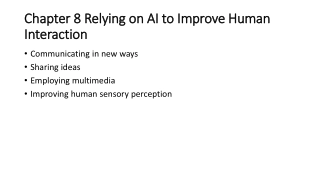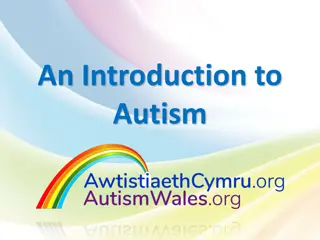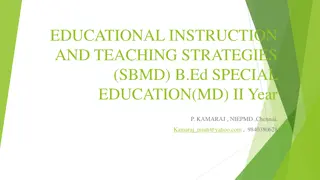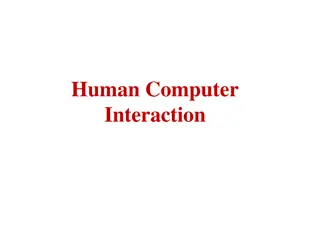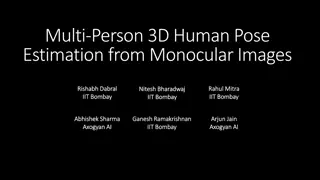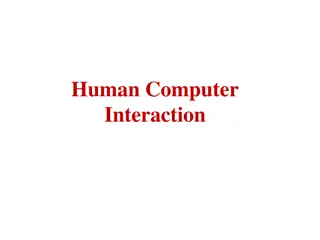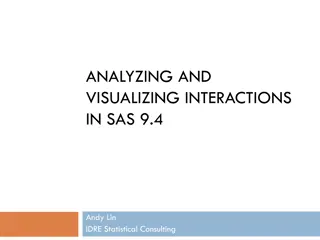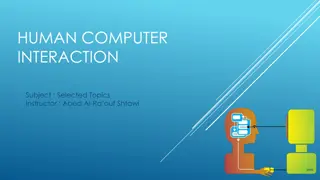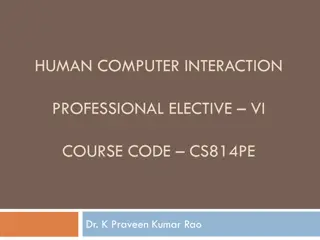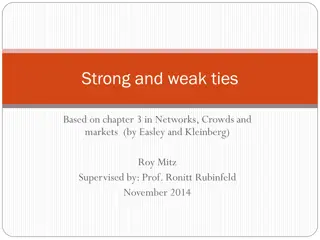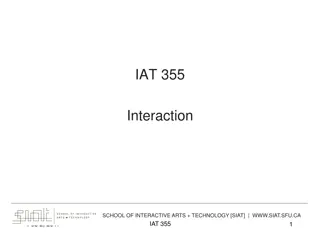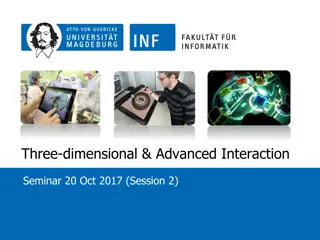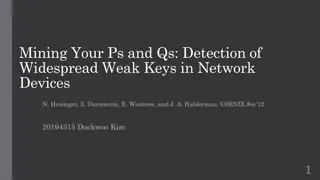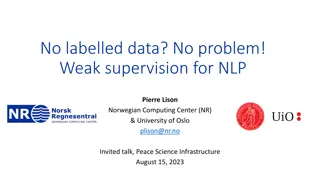Enhancing Human Interaction with AI: Communication Innovations
Exploring the role of AI in improving human interaction, this chapter delves into new ways of communicating, using multimedia, and enhancing sensory perception. From electronic noses to new alphabets like emoticons and emojis, AI is revolutionizing how we exchange ideas and express emotions.
1 views • 19 slides
Understanding Strong and Weak Forms in English Pronunciation
Exploring the concept of strong and weak forms in English pronunciation, this content discusses the importance of using weak forms in speech, the rules of occurrence of strong forms, and how to recognize the position of weak forms. Examples and explanations illustrate how function words are weakened
1 views • 25 slides
Understanding Human-Environment Interaction: Environmental Determinism vs. Possibilism
Human-environment interaction is a two-way process shaping cultures and behaviors. Explore the theories of environmental determinism and possibilism, which offer contrasting views on the influence of physical conditions on human societies. Environmental determinism emphasizes the impact of the envir
0 views • 18 slides
Understanding Autism: A Comprehensive Overview
Autism, a hidden disability, presents challenges in social interaction, communication, and sensory processing. It is a lifelong condition that affects individuals in various ways. Recognizing the signs and understanding the needs of autistic individuals can greatly impact their lives. This introduct
1 views • 20 slides
Impact of Changing Communication Technologies on Cross-Cultural Interaction and Globalisation
The impact of changing communication technologies on cross-cultural interaction is evident in events like the Cronulla Riots, where SMS and social media played a powerful role in inciting violence. This led to a closer examination of how technology influences identity, power, and authority dynamics
1 views • 7 slides
Early Intervention and Teaching Strategies in Special Education
Early Intervention in Special Education involves promoting the development of children with delays or disabilities through a system of services focusing on various skills like language, cognition, and social interaction. Understanding brain plasticity, gene-environment interaction, and the importanc
1 views • 19 slides
Understanding Human Perception and Interaction in HCI
Human-Computer Interaction (HCI) involves the study of how humans interact with computers using various input and output channels such as vision, hearing, touch, and memory. Vision is crucial as it is the primary source of information, while hearing and touch play significant roles in conveying info
1 views • 12 slides
Analyzing Interaction Effects in Composite-Based SEM
Explore the concept of interaction effects in composite-based structural equation modeling (SEM) through topics like the logic of interaction, estimating effects, multigroup analysis, and visualizing effects. Learn about moderators, their role in relationships between variables, and techniques for a
1 views • 23 slides
3D Human Pose Estimation Using HG-RCNN and Weak-Perspective Projection
This project focuses on multi-person 3D human pose estimation from monocular images using advanced techniques like HG-RCNN for 2D heatmaps estimation and a shallow 3D pose module for lifting keypoints to 3D space. The approach leverages weak-perspective projection assumptions for global pose approxi
0 views • 8 slides
Understanding Central and Non-Central Forces in Physics
Newton's laws of motion introduced the concept of forces, leading to the classification of fundamental forces like gravitational, electromagnetic, strong nuclear, and weak nuclear forces. Central forces act toward or away from a fixed center, while non-central forces are affected by additional param
0 views • 7 slides
Artificial Intelligence Heuristic Search Techniques
Assistant Professor Manimozhi from the Department of Computer Applications at Bon Secours College for Women in Thanjavur is exploring Artificial Intelligence concepts such as weak methods and Generate-and-Test algorithms. The content covers heuristic search techniques like generating and testing, hi
0 views • 7 slides
Understanding Buffer Solutions and pH Indicators
Buffer solutions resist changes in pH upon the addition of acids or bases, maintaining a stable pH level. They consist of a weak acid and its conjugate base or a weak base and its conjugate acid. pH indicators are weak acids or bases that exhibit color changes based on their degree of dissociation a
0 views • 21 slides
Understanding Human-Computer Interaction and Input Devices
Human-Computer Interaction involves the interaction between users and computers, exploring various input devices such as keyboards, handwriting recognition, and pointing devices. Learn about the evolution from batch data entry to modern forms of interaction, including speech recognition and stylus i
0 views • 12 slides
Understanding Weak Signal Propagation in Radio Waves
This informative content delves into weak signal propagation and its various aspects related to electromagnetic waves, particularly in the context of radio communication. It covers topics such as radio waves, radio horizon, knife-edge diffraction, tropospheric scatter mode, auroral reflection, and m
1 views • 37 slides
Adapting Contest Strategies for Declining Solar Cycle 24 and Solar Cycle 25 Precursors
As Solar Cycle 24 rapidly declines, preparations for the subsequent Solar Cycle 25 are crucial. Insights on weak solar activity, potentially weak Cycle 25, and the impact on contest strategies are discussed. Improved DX propagation, reliable openings, and signal strengths to Europe and Japan, amidst
0 views • 12 slides
The Vital Role of Encryption in Safeguarding the Digital Economy
Encryption plays a crucial role in protecting the digital economy by providing secure communication channels. Professor Peter Swire from Ohio State University emphasizes the need for strong encryption over weak cybersecurity measures. He discusses the history of wiretaps, the shift to strong cryptog
0 views • 15 slides
Understanding Interaction Effects in Regression Analysis using SAS 9.4
Regression models help analyze effects of independent variables (IVs) on dependent variables (DVs, like weight loss from exercise time). Interactions explore how one IV's effect can be modified by another IV (moderating variable, MV). In this seminar's purpose, techniques to estimate, test, and grap
0 views • 137 slides
Understanding Acids and Bases in Chemistry
Acids donate protons, while bases accept them. Strong acids ionize completely while weak acids only partially ionize, resulting in a Ka value less than one. Water, being amphoteric, can both donate and accept protons. The ionization of water leads to a constant Kw value of 10^-14. Explore the ioniza
0 views • 15 slides
Understanding Human-Computer Interaction: CLI vs. GUI
Explore the evolution of Human-Computer Interaction (HCI) from its history to the advent of Command Line Interfaces (CLI) and Graphical User Interfaces (GUI). Learn about the advantages, disadvantages, applications, and how CLI and GUI differ in user interaction paradigms.
0 views • 19 slides
Weak Interactions and Hydrogen Bonding in Molecular Forces
Exploring van der Waals forces, hydrogen bonding, and weak interactions in intermolecular forces and surface interactions. Understanding interactions between backbone peptide groups and orientation dependence of hydrogen bonding through dispersion forces and repulsive potentials.
0 views • 22 slides
Overview of Human-Computer Interaction Course
Gain insight into Human-Computer Interaction (HCI) by understanding user interface design, alternative computing methods, cognitive psychology models, ethical responsibilities, and team-work experience. Explore conventional and non-traditional interface paradigms, design tools for accessibility, and
0 views • 108 slides
Understanding Strong and Weak Links in Team Talent Distributions
Talent distributions within sports teams can vary greatly, affecting team performance. The concepts of strong and weak links in team dynamics are explored through examples in hockey, shedding light on how having the best player or avoiding the worst player can impact outcomes. The correlation betwee
0 views • 13 slides
Understanding Interaction Design in Human-Computer Interaction
Interaction design focuses on creating interactive products that are easy, effective, and enjoyable to use. It aims to reduce negative user experiences while enhancing positive ones. Designing interactive products requires understanding user activities, interfaces, and device arrangements to support
0 views • 11 slides
Understanding Strong and Weak Ties in Social Networks
Explore the concepts of strong and weak ties in social networks based on Easley and Kleinberg's theories. Delve into the flow of information, structural differences among nodes, and the evolution of networks over time. Discover the significance of triadic closure principle and clustering coefficient
0 views • 60 slides
Understanding Buffers in Chemistry
Buffers play a crucial role in maintaining stable pH levels in solutions. They are composed of a weak acid and its conjugate base or a weak base and its conjugate acid. This summary covers the definition of buffers, differentiation between buffer and non-buffer systems, the behavior of buffers when
3 views • 23 slides
Understanding Interaction in Information Visualization
Information visualization in the realm of interactive arts and technology involves two main components: Representation and Interaction. Representation focuses on visual elements, while Interaction drives user engagement and action. Through innovative visual representations and user interaction, info
0 views • 34 slides
Dynamo and Bayou: High Availability and Weak Consistency in Modern Applications
Dynamo and Bayou databases offer high availability and weak consistency, making them suitable for modern applications with super high demands. Examples of suitable applications include flight ticket booking, Amazon shopping carts, and more. Availability is crucial for accommodating millions of custo
0 views • 38 slides
Three-Dimensional & Advanced Interaction Seminar Highlights
The seminar on Three-Dimensional & Advanced Interaction held on Oct 20, 2017, featured a diverse group of participants and engaging topics such as direct-touch interaction, freehand 3D interactions, evaluation of new technologies, and more. The sessions covered various aspects of interaction design,
0 views • 12 slides
Understanding Weak Superconductivity and Functional Coordinates
Delve into the realm of weak superconductivity and the significance of functional coordinates in this informative presentation. Explore the intricacies of these concepts through a series of visually appealing slides that shed light on their characteristics and applications. Gain insights into the re
0 views • 8 slides
Understanding the Titration of Weak Acids and Amino Acids
Titration is a crucial technique used to determine the properties of weak acids and amino acids. This process involves calculating pH values, degree of ionization, and understanding the ionization equilibrium of different acid-base systems. Various examples, including glycine hydrochloride, isoelect
0 views • 15 slides
Understanding Acids and Bases: Ionization and Properties
Acids donate protons while bases accept them. Strong acids and bases ionize completely, while weak acids ionize partially. Water is amphoteric, capable of both accepting and donating protons. The equilibrium constant Kw for water is 10^-14. Understanding the ionization of weak acids and weak bases h
0 views • 15 slides
Weak Keys Detection in Network Devices
TLS and SSH rely on RSA and DSA for security, but weaknesses in random number generation can lead to widespread weak keys among hosts on the Internet. This paper uncovers the prevalence of repeated keys and easily inferred private keys, emphasizing the importance of entropy pools in key generation.
0 views • 28 slides
Weak Visibility Queries of Line Segments in Simple Polygons - Overview
This information discusses weak visibility queries of line segments in simple polygons, focusing on topics such as visibility of line segments, visibility polygons, visibility graphs, and related previous work on preprocessing and data structures for visibility queries in simple polygons.
0 views • 26 slides
Mastering Weak 2 Opening Hands in Bridge Strategy
Learn the history and strategies behind weak 2 opening bids in Bridge, including the goals, rules, and considerations like suit quality, point range, and vulnerability. Expert recommendations emphasize the importance of partnership agreements for successful preempts.
0 views • 23 slides
Understanding Acids and Bases in Chemistry: Key Concepts and Terminology
This chapter delves into the fundamental concepts of acids and bases in chemistry, covering Arrhenius, Bronsted-Lowry, and Lewis definitions. It discusses conjugate acids and bases, acid dissociation, dissociation of strong and weak acids, and the differences between strong and weak acids/bases. The
0 views • 41 slides
Weak Supervision for NLP: Overcoming Labelled Data Challenges
Addressing the challenge of acquiring labelled data for NLP models, weak supervision techniques offer solutions through alternative annotation methods and leveraging diverse data sources. This talk highlights the importance of overcoming the scarcity of labelled data in machine learning and NLP task
0 views • 18 slides
Memory Models: Enhancing Semantics for Programs with Data Races
This content delves into the importance of establishing stronger memory models to provide better semantics for programs experiencing data races. It highlights the challenges faced due to weak semantics in programming languages like C++ and Java, emphasizing the need for improved memory models to add
0 views • 61 slides
Understanding Bloom Effects in Game Design
Bloom effects, such as weak scattering and convolution, enhance the visual appeal of games by simulating light scattering. They add realism and customization options to game graphics, improving the overall visual experience. Weak scattering causes subtle yet impactful effects like glare and diffract
1 views • 14 slides
Understanding the Impact of Water Quality on Herbicide Efficacy
Water quality plays a crucial role in determining the effectiveness of herbicides. Factors such as water pH, hardness, turbidity, and dissolved materials can influence herbicide efficacy. The interaction between water chemistry and herbicide chemistry is essential for successful applications. Differ
0 views • 13 slides
Analgesic Study with Three Treatments Crossed with Gender
This study explores the effects of analgesic treatments crossed with gender on pain levels. The data analysis includes factors such as gender and drug type, and the statistical model examines pain index as a linear function of factor levels. The ANOVA results indicate significant effects of gender,
0 views • 17 slides
